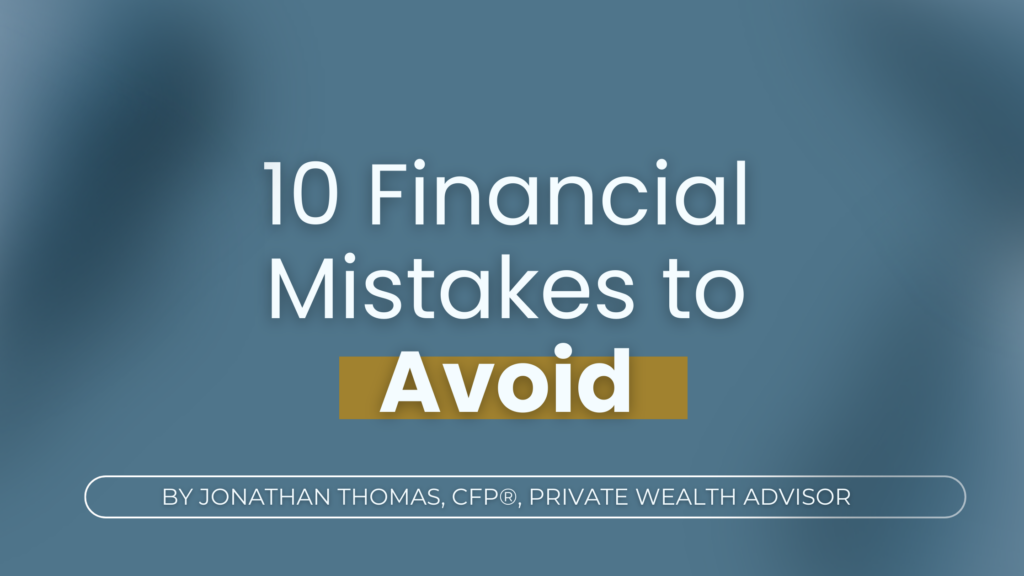By Jonathan Thomas, CFP®, Private Wealth Advisor
During my time in the financial services industry, I’ve been fortunate to work with several hundred clients, each with unique circumstances, and help them make better financial decisions. These are some of the most common mistakes I see—and they are often avoidable.
1. Not Working with an Advisor
This may sound self-serving, but your retirement—what you’ve been saving your whole working life for—is too important to mess up. Everyone should have someone in their corner, looking out for their best interests, even if they’re capable of managing things on their own. We all have blind spots. However, more important than working with an advisor is working with the right advisor—someone who understands your situation, risk tolerance, goals, and family. If your advisor isn’t that person, it’s time to find someone new.
2. Holding Too Much Cash Earning Little Interest
This one is low-hanging fruit, but it seriously adds up over time. Consider $50,000 sitting in your checking account earning 0.01% interest that could instead be invested in a money market fund at 4.5%. That’s $2,250 per year—maybe not life-changing, but certainly not nothing, either.
3. Not Having a Budget
You don’t have to go crazy, but you should have a general idea of where your money goes. If you’re hitting savings goals—like putting 10% of your income into your 401(k)—you might not need to stress. However, avoid wasting money on unused subscription services or overpaying for unnecessary things. My wife calls me cheap, but I prefer “frugal.” I’d rather spend money on things I truly value than throw it away.
4. Owning the Wrong Life Insurance
You should have life insurance when you’re young, especially if you are married with kids, to replace your income if something should happen to you. A simple rule of thumb: 20x your after-tax income in a low-cost term policy. If you’re 30 years old paying into a whole life insurance policy as a form of retirement savings, you’re doing something wrong. Life insurance can also be held in an irrevocable life insurance trust (ILIT).
5. Buying Annuities
This is almost never a good idea. Annuities are expensive, commission-riddled products that benefit everyone except the buyer. They’re rarely used as intended and often leave clients with an expensive, underperforming, tax-inefficient asset they didn’t want or need.
6. Not Having an Estate Plan
Everyone should have essential documents like a healthcare proxy, power of attorney, and at the very least, a will—especially if you have kids. It’s crucial to name guardians for your children in case something happens to you (and your spouse).
7. Overcomplicating Finances
Simplify, simplify, simplify. More isn’t always better. Having ten credit cards isn’t a great idea. Before kids, I played the credit card game, and it helped my wife and me take vacations. Now, I have two cards, which makes life easier. Simplification applies to other areas, too. Why have three checking accounts or multiple advisors across different custodians? It’s more work for you and often results in worse outcomes.
8. Watching Too Much News
Watching CNBC won’t make you a better investor. It might help you understand what happened that day, but it won’t help you predict tomorrow. At best, you’ll gain some knowledge about current events. At worst, you’ll become stressed, anxious, and more likely to make poor decisions.
9. Comparing Yourself to Others
I’m often asked, “How does my situation compare to others my age?” That’s a tough question because no two people are dealt the same hand in life. Some start out with student loan debt, while others receive financial gifts. Some are supporting three kids, while others have none. Everyone’s circumstances are different, so comparing yourself to others isn’t helpful. Instead, focus on your own goals and what’s within your control.
10. Not Having a Plan
Many people operate on preconceived notions about what they’re “supposed” to do. For example, I often hear, “I’ll work until 67 to get full Social Security benefits.” But would retiring at 65 with reduced benefits really hurt your financial plan? Why not work until 70 to get an 8% increase? Those last two working years could be the healthiest you’ll ever be again. If you could retire, would you? Do you even know if you can? It’s time to have a plan.









